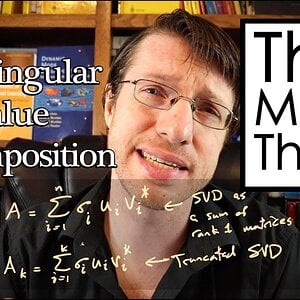Svd Definition and 29 Threads
-
N
What is the goal of the problem?
Question: Correct Answer: U and VT in code:- nao113
- Thread
- Machine Machine learning Svd
- Replies: 1
- Forum: Engineering and Comp Sci Homework Help
-
Lecture 4 - Headaches from math - Saving lives with the SVD
Here we review the mathematics that goes into CT scanners and the inversion of the Radon transform. The approach given here uses the Moore-Penrose pseudo inverse to invert a tall and skinny matrix. We can get a nice representation of the pseudo inverse by using the singular value decomposition (SVD)- AcademicOverAnalysis
- Media item
- Medical imaging Svd
- Comments: 0
- Category: Misc Math
-
Lecture 3 - How SVDs are used in Facial Recognition Software
This video builds on the SVD concepts of the previous videos, where I talk about the algorithm from the paper Eigenfaces for Recognition. These tools are used everywhere from law enforcement (such as tracking down the rioters at the Capitol) to unlocking your cell phone.- AcademicOverAnalysis
- Media item
- Data science Linear algebra Svd
- Comments: 0
- Category: Misc Math
-
Lecture 2 - Understanding Everything from Data - The SVD
In this video I give an introduction to the singular value decomposition, one of the key tools to learning from data. The SVD allows us to assemble data into a matrix, and then to find the key or "principle" components of the data, which will allow us to represent the entire data set with only a few- AcademicOverAnalysis
- Media item
- Data science Linear algebra Pca Svd
- Comments: 0
- Category: Misc Math
-
Lecture 1 - Data Driven Methods in Dynamical Systems
This is an introductory video for my class on data driven methods in dynamical systems theory. We will cover topics including SVDs, FFTs, DMD, PCA, and many other acronyms.- AcademicOverAnalysis
- Media item
- Data science Fft Graduate Svd
- Comments: 0
- Category: Misc Math
-
Z
How to find first matrix of SVD?
Homework Statement I don't know how to find the first matrix of SVD. I know how to find the middle one and the last one. For first one some tutorials found AV1. I don't know how to find it. Is there any simple way to find the first matrix. 2. Homework Equations [/B] SVD = A*Summation matrix *...- zak100
- Thread
- Matrix Svd
- Replies: 10
- Forum: Calculus and Beyond Homework Help
-
E
I Which Are the EOFs in SVD?
Considering I have a matrix ##\mathbf{A}## which has a size of ##M \times N##, how can I compute the Empirical Orthogonal Functions (EOFs) by Singular Value Decomposition (SVD)? According to SVD, the matrix ##\mathbf{A}## is ##\mathbf{A} = \mathbf{U} \mathbf{\Sigma} \mathbf{V}^{T}## where a...- ecastro
- Thread
- Svd
- Replies: 1
- Forum: Linear and Abstract Algebra
-
E
I Eigenspectra and Empirical Orthogonal Functions
Are the Eigenspectra (a spectrum of eigenvalues) and the Empirical Orthogonal Functions (EOFs) the same? I have known that both can be calculated through the Singular Value Decomposition (SVD) method. Thank you in advance.- ecastro
- Thread
- Eigenvalues Functions Orthogonal Svd
- Replies: 4
- Forum: Linear and Abstract Algebra
-
E
I Can you Explain this SVD Application?
Here is the website: http://www.columbia.edu/itc/applied/e3101/SVD_applications.pdf I need help on understanding the second part of the document, page 13 onwards. On page 15, it showed 3 data sets, relative elevation as a function of kilometers across axis, however at page 16, the author...- ecastro
- Thread
- Application Explain Svd
- Replies: 8
- Forum: Linear and Abstract Algebra
-

A reasonable analogy for understanding similar matrices?
I don't really feel that I understand what it means for two matrices to be similar. Of course, I understand the need to understand ideas on their own terms, and that in math analogies are very much frowned upon. In asking if you know of any "reasonable" analogies for what it means for two...- kostoglotov
- Thread
- Analogy Diagonalization Matrices Svd
- Replies: 4
- Forum: Linear and Abstract Algebra
-
C
Underdetermined vs Overdetermined Systems
I'm trying to create a model which is of the form y = (a0 + a1l)[b0+MΣm=1 bmcos(mx-αm)] [c0 + NΣn=1 cn cos(nz-βn)] In the above system, l,x and z are independent variables and y is the dependent variable. The a, b and c terms are the unknowns. To solve for these unknowns, I have two separate...- CoSurShe
- Thread
- Data analysis Regression analysis Svd Systems
- Replies: 3
- Forum: Linear and Abstract Algebra
-
A
SVD of a reduced rank matrix still has non-zero U and V`?
In a given matrix A, the singular value decomposition (SVD), yields A=USV`. Now let's make dimension reduction of the matrix by keeping only one column vector from U, one singular value from S and one row vector from V`. Then do another SVD of the resulted rank reduced matrix Ar. Now, if Ar is...- Adel Makram
- Thread
- Matrix rank Svd
- Replies: 2
- Forum: Linear and Abstract Algebra
-

Why are all the singular values of A equal to 1?
Problem: Suppose u1,...un and v1,...vn are orthonormal bases for Rn. Construct the matrix A that transforms each vj into uj to give Av1=u1,...Avn=un. Answer key says A=UV^T since all σj=1. Why is all σj=1?- rpthomps
- Thread
- Bases Svd
- Replies: 9
- Forum: Calculus and Beyond Homework Help
-
M
The Power of SVD in Data Processing: Insights and Examples
Hi PF! Can you please tell me why it is beneficial to use SVD in data processing? My understanding is, given a lot of data, if we arrange it in a matrix, we can filter out the important pieces from the unimportant pieces. Evidently, any matrix ##A## can be decomposed into ##U \Sigma V^T##...- member 428835
- Thread
- Svd
- Replies: 10
- Forum: Linear and Abstract Algebra
-
R
SVD, PCA, multi dimensional visualization
I just did some quick searches for open source multi dimensional data visualization, but can't find what I'm looking for. Before I spend time coding it up, I want to see if some one's done it already. The data will be points with multi (n>20) dimensional coordinates 1) I want to be...- rigetFrog
- Thread
- Pca Svd Visualization
- Replies: 3
- Forum: MATLAB, Maple, Mathematica, LaTeX
-
T
SVD Low-Rank Approximation Algorithm
I'm looking for a concise description of an algorithm for low-rank approximation via SVD. I've seen a number of articles referring to Lanczos method and finding eigenvalues but nothing going all the way to determining all the matrices involved in the low-rank SVD of a given matrix. Any...- TheOldHag
- Thread
- Algorithm Approximation Svd
- Replies: 8
- Forum: Linear and Abstract Algebra
-
P
Linear Systems with pseudoinverse matrix using SVD
Hi! I have a question concerning solving a system of linear equations. I know that the pseudoinverse matrix by using SVD is useful for this, but haven't gotten the pieces together yet. Let's assume I have this system of linear equations with each equation having one 3-component vector (V1)...- Phong
- Thread
- Linear Matrix Svd Systems
- Replies: 2
- Forum: Linear and Abstract Algebra
-

MATLAB Learn How to Efficiently Compress Color Images with SVD in Matlab
Are there any resources which use Matlab to image compress a colour image using SVD? I can only find information where I need to convert to gray scale first.- matqkks
- Thread
- Compression Image Svd
- Replies: 1
- Forum: MATLAB, Maple, Mathematica, LaTeX
-

MATLAB SVD and image compression for Matlab
Are there any resources which use Matlab to image compress a colour image using SVD? I can only find information where I need to convert to gray scale first.- matqkks
- Thread
- Compression Image Matlab Svd
- Replies: 2
- Forum: MATLAB, Maple, Mathematica, LaTeX
-
S
What are the requirements for SVD to work?
Dear fellows, during my internship I've stumbled over a problem of analysis. To cut things short some pseudoinverses have to be calculated. For one of them it does not work, s.t. A'*A \neq I. I just wondered about the requirements to find a pseudoinverse. One of the eigenvalues is zero... -
E
Finding SVD of Matrix H: Summing H1 and H2's SVD Values?
Hi, I need to find the singular value decomposition (SVD) of a matrix H=H1+H2. Is this equivalent to sum the SVD values of H1 and H2? Thanks- EngWiPy
- Thread
- Matrix Svd
- Replies: 2
- Forum: General Math
-
E
SVD vs Eigenvalue Decompositon (Diagonalizability)
Okay, I know that if I can't get n linearly independent eigenvectors out of a matrix A (∈ℝnxn), it is not diagonalizable (and that some necessary conditions for diagonalizability in this regard may be being symmetric and/or having distinct eigenvalues.) This is how things are for the usual...- eehsun
- Thread
- Eigenvalue Svd
- Replies: 3
- Forum: Linear and Abstract Algebra
-
S
Derivative of SVD V and U matrices
sorry I am new and posted instead of previewing...im currently writing the post- saulg
- Thread
- Derivative Matrices Svd
- Replies: 2
- Forum: Linear and Abstract Algebra
-
S
What Happens When the V Matrix is Zero in SVD?
Semester is over but still want to figure this out Prob 8 on here: http://www.math.uic.edu/~akers/310PracticeFinal.pdf When trying to SVD that matrix one of the U or V matrix turns out to be zero but the answer key has just the general formula for SVD can anyone explain thanks- SELFMADE
- Thread
- Matrix Svd Zero
- Replies: 5
- Forum: Linear and Abstract Algebra
-
A
Using SVD to solve a set of equations.
Homework Statement This is not a homework problem. I encountered this while working with total least squares for the first time. Ultimately a point is reached where Az=0 must be solved. z is of the form [x,1]^{T}. Let A be nxm, z be mx1. Suppose A is rank deficient by one. So the SVD of A...- Aerostd
- Thread
- Set Svd
- Replies: 1
- Forum: Engineering and Comp Sci Homework Help
-
N
What Are the Key Differences Between Schmidt Decomposition and SVD?
What's the difference between Schmidt and Single valued decomposition? https://www.physicsforums.com/showthread.php?t=323859 How could I find it for |\psi>_{AB} = const( |0>_A|0>_B+ |1>_A|1>_B) + const( |0>_A|1>_B+|1>_A|0>_B) ?- Nusc
- Thread
- Svd
- Replies: 1
- Forum: Quantum Physics
-
D
What is the Geometric Interpretation of the Final Step in SVD?
Ax = U \Sigma V^T x (A is an m by n matrix) I understand the first two steps, 1) V^T takes x and expresses it in a new basis in R^n (since x is already in R^n, this is simply a rotation) 2) \Sigma takes the result of (1) and stretches it The third step is where I'm a bit...- daviddoria
- Thread
- Geometric Geometric interpretation Interpretation Svd
- Replies: 1
- Forum: Linear and Abstract Algebra
-
I
How to accelerate the SVD algorithm?
I've written a program in c language in terms of the GR SVD algorithm. To my dispointment,its performance is worse than the svd of matlab. I wish to get to know which algorithm the MATLAB used. Who may tell me? Thanks.- irongreat
- Thread
- Accelerate Algorithm Svd
- Replies: 11
- Forum: Programming and Computer Science
-
H
MATLAB Complex-Symmetric Matrix SVD with Matlab: Conjugate Relationship Not Seen
For a square, complex-symmetric matrix ##A##, the columns of the right and left matrices ##U## and ##V## of the singular value decomposition should be complex conjugates, since for A=A^T, A\in{\mathbb C}^{N\times N}, A = U\Sigma V^H, A^T=(U\Sigma V^H)^T so that U\Sigma V^H=(V^H)^T\Sigma U^T...- Heavytortoise
- Thread
- Matlab Svd
- Replies: 2
- Forum: MATLAB, Maple, Mathematica, LaTeX



